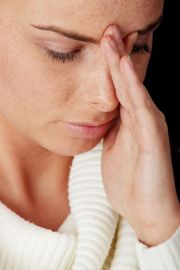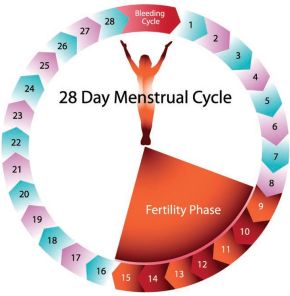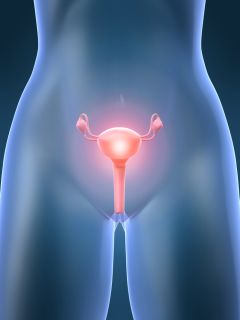
 Anxiety rates are higher among women with PCOS (Polycystic Ovarian Syndrome). In some cases, anxiety can lead to a frightening panic attack. Here we’ll discuss Polycystic Ovary Syndrome, which is sometimes called Polycystic Ovarian Disorder or PCOD. The emotional consequences for women with PCOS can be devastating, but there is something you can do. A healthy lifestyle, complete with a nutritious diet, plentiful exercise, and targeted nutritional supplements and/or prescription medications, can help you bring your PCOS symptoms under control.
Anxiety rates are higher among women with PCOS (Polycystic Ovarian Syndrome). In some cases, anxiety can lead to a frightening panic attack. Here we’ll discuss Polycystic Ovary Syndrome, which is sometimes called Polycystic Ovarian Disorder or PCOD. The emotional consequences for women with PCOS can be devastating, but there is something you can do. A healthy lifestyle, complete with a nutritious diet, plentiful exercise, and targeted nutritional supplements and/or prescription medications, can help you bring your PCOS symptoms under control.
+ Click here to learn about the all natural PCOS 5-Element Solution
+ Click here to read more articles about PCOS and Emotional Conditions
Symptoms
What Is Anxiety?
Keep in mind that your hormones are considered ‘chemical messengers’ that activate many various processes in your body, such as growth and energy production. In PCOS patients, these hormones, when not functioning properly, can create numerous side effects or symptoms related to PCOS:
 Irregular or Absent Menstrual Periods:? Often caused by anovulation, the absence of a regular menstrual cycle is both an annoyance and a serious health concern for you.
Irregular or Absent Menstrual Periods:? Often caused by anovulation, the absence of a regular menstrual cycle is both an annoyance and a serious health concern for you.- Polycystic Ovaries:? You may develop an Ovarian Cyst (or several cysts) or you may have none at all. The name of this condition is sometimes misleading since Polycystic Ovaries are not a ‘given’ with Polycystic Ovary Syndrome patients.
- Infertility:? This is commonly the result of anovulation (when your ovaries fail to release an egg). Difficulties conceiving can be emotionally devastating to you and your partner.
- Hair Issues:? Hirsutism (excessive growth of hair in abnormal locations like your face, arms, legs, etc.) or thinning hair (like male pattern baldness) can take an emotional toll on women.
- Weight Gain:? This is another embarrassing and emotionally complex symptom that can lead to serious health issues, like heart disease and diabetes.
- Skin Issues:? This can include mild to severe adult acne, acrochordons (known as skin tags, which are harmless but uncomfortable flaps of skin) and acanthosis nigricans (dark, thick folds of skin that feel like velvet and often develop along your neck, groin, underarms, or other creases of your skin).
After looking at these symptoms, it’s probably no surprise that recent studies found a large number of women with PCOS endure some type of anxiety issues, depression, and perhaps even panic attacks. For example, let’s examine just one symptom – infertility. The stress of infertility is usually hard enough to handle. It can cause anxiety, depression, insomnia problems, and marital problems. If you add other PCOS symptoms, it’s not hard to see why panic attacks can be a real occurrence in some women.
Research indicates the hormonal imbalance that causes many of these physical ailments can also create mental issues as well. According to a study at the University of Duisburg-Essen in Germany, ‘“PCOS patients showed enhanced HPA-axis and heart rate reactivity as well as a reduced up-regulation of IL-6 in response to stress.” In other words, “the altered stress reactivity in PCOS patients may constitute a link between depression, overweight, and the cardiovascular and diabetes risks associated with the diagnosis.”4
So what do we know about PCOS anxiety? The University of Pennsylvania might have summed it up best…
“Women with polycystic ovary syndrome have gynecologic, reproductive and metabolic co-morbidities that span their entire lifespan. More recently, a higher risk of PCOS mood and anxiety disorders has been reported in women with PCOS. Women with PCOS have higher depression scores and a higher risk of depression independent of BMI (Body Mass Index)…. Women with PCOS are also at risk for symptoms of generalized anxiety disorder. There is insufficient data examining the risk of other anxiety disorders such as social phobia, obsessive compulsive disorders and panic disorder. In a number of patients, some of these disorders coexist, increasing the health burden. These data results underscore the need to screen all women with PCOS for mood and anxiety disorders and adequately treat women who are diagnosed with these conditions.”5
That means if you’re suffering from PCOS and you’re feeling anxious, or experiencing panic attacks, it’s not surprising. These psychological factors are quite real, but the good news is you have treatment options to explore to help control PCOS anxiety and mood disorders.
Causes
Correlation between PCOS and Insulin Resistance
 First, before we talk about anxiety, let’s examine Polycystic Ovarian Syndrome (PCOS) and what causes it. Polycystic Ovarian Syndrome is a common hormone disorder affecting 6-10 percent of women of reproductive age.1 It is highlighted by both endocrine and gynecological symptoms, including chronic anovulation, metabolic syndrome, hyperandrogenism, and Insulin Resistance.2 Plus, it is more common than you might think. According to recent statistics, over seven million women in the United States live with this life-altering condition.3
First, before we talk about anxiety, let’s examine Polycystic Ovarian Syndrome (PCOS) and what causes it. Polycystic Ovarian Syndrome is a common hormone disorder affecting 6-10 percent of women of reproductive age.1 It is highlighted by both endocrine and gynecological symptoms, including chronic anovulation, metabolic syndrome, hyperandrogenism, and Insulin Resistance.2 Plus, it is more common than you might think. According to recent statistics, over seven million women in the United States live with this life-altering condition.3
Polycystic Ovarian Syndrome happens when a woman’s hormone levels are not in balance. This hormone disorder is often the result of a condition called Insulin Resistance (IR) — a disorder that reduces the sensitivity of the body’s cells to insulin.6 Insulin is required to allow the glucose (blood sugar) into your bloodstream. From the bloodstream it enters your cells where it is then converted into the energy your body needs to function. With IR patients, these same cells slowly become ‘resistant’ if your insulin spikes or surges too often (mostly likely caused by a daily diet rich in refined carbohydrates).
Treatment Options
Treatments for Overcoming PCOS
 There is no single cure for PCOS, but there are many ways to treat the symptoms. Some of these PCOS treatments include:
There is no single cure for PCOS, but there are many ways to treat the symptoms. Some of these PCOS treatments include:
- Birth Control Pills – This is often the most common form of pharmacy treatment for PCOS. Birth control pills contain hormones that can help reduce acne and irregular hair growth, while regulating menstrual periods.
- Metformin – This medicine, originally a diabetes drug, might help with your Insulin Resistance PCOS issues.
- Anti-androgens – These drugs help with reducing effects of male hormones on women with PCOS, as well as address issues like hair growth and acne.
However, for women seeking a more holistic approach, there is help there too. You can focus on eating well, exercise, and lifestyle changes to help you combat PCOS.
Natural Therapies
PCOS Treatment for Insulin Resistance
 Since there is no stand-alone cure for PCOS or Insulin Resistance, what can you do? There are two steps actually:
Since there is no stand-alone cure for PCOS or Insulin Resistance, what can you do? There are two steps actually:
- Eating well – Eating well means consuming plenty of vegetables and fruits, while sticking to whole grains. You should also avoid refined sugars and/or foods with sugars added, as well as processed foods.
- Healthy Lifestyle – Eating a proper diet means very little without regular exercise. It’s important to keep your body in shape. Your physical wellbeing plays a large role in how you feel emotionally.
Furthermore, when it comes to exercise, it’s important to start slowly. If you’ve been inactive, be sure you don’t push your body beyond its limits. The purpose is to make strides. That might mean walking rather than running at first, or toe touches before jumping jacks. The point is: don’t put too much stress on your body in a quest to be healthy. Grow your exercise plan rather than diving in headfirst. Not only is it safer, but you’ll also find you’re more inclined to continue your plan. When you set smaller goals for yourself, and succeed at them, you’re more likely to raise the bar a little bit higher each week, month, etc.
Sometimes you need more help and that’s why Insulite Health is here. We’re consistently trying to help women successfully achieve the key steps to fight Insulin Resistance. Our goal is to empower, educate, and emotionally support women who are suffering from PCOS with a complete system of targeted nutritional supplements, nutrition plans, exercise plans and emotional support. So, be sure to check out some of the informative resources available here to learn about a more holistic approach to combating PCOS.
Next Steps
- Take the PCOS Quiz! Get your score and assess your hormone health risks.
- Join our Facebook Sisterhood Group Pose your questions to this group of like-minded women. Get the answers to your questions and the support you need.
- Checkout the Hormone Reset. Guided Practices to eliminate anxiety, lose weight and boost energy.
We are committed to helping women reverse their symptoms of hormone imbalance – a major cause of excess weight gain, adult acne, unwanted facial hair, depression, anxiety, and heartbreaking female infertility.
©Insulite Health empowers women with hormone imbalance to transform their lives through a process of healing with the Natural Hormone Solution –a complete solution for helping women reverse the symptoms hormone imbalance..
